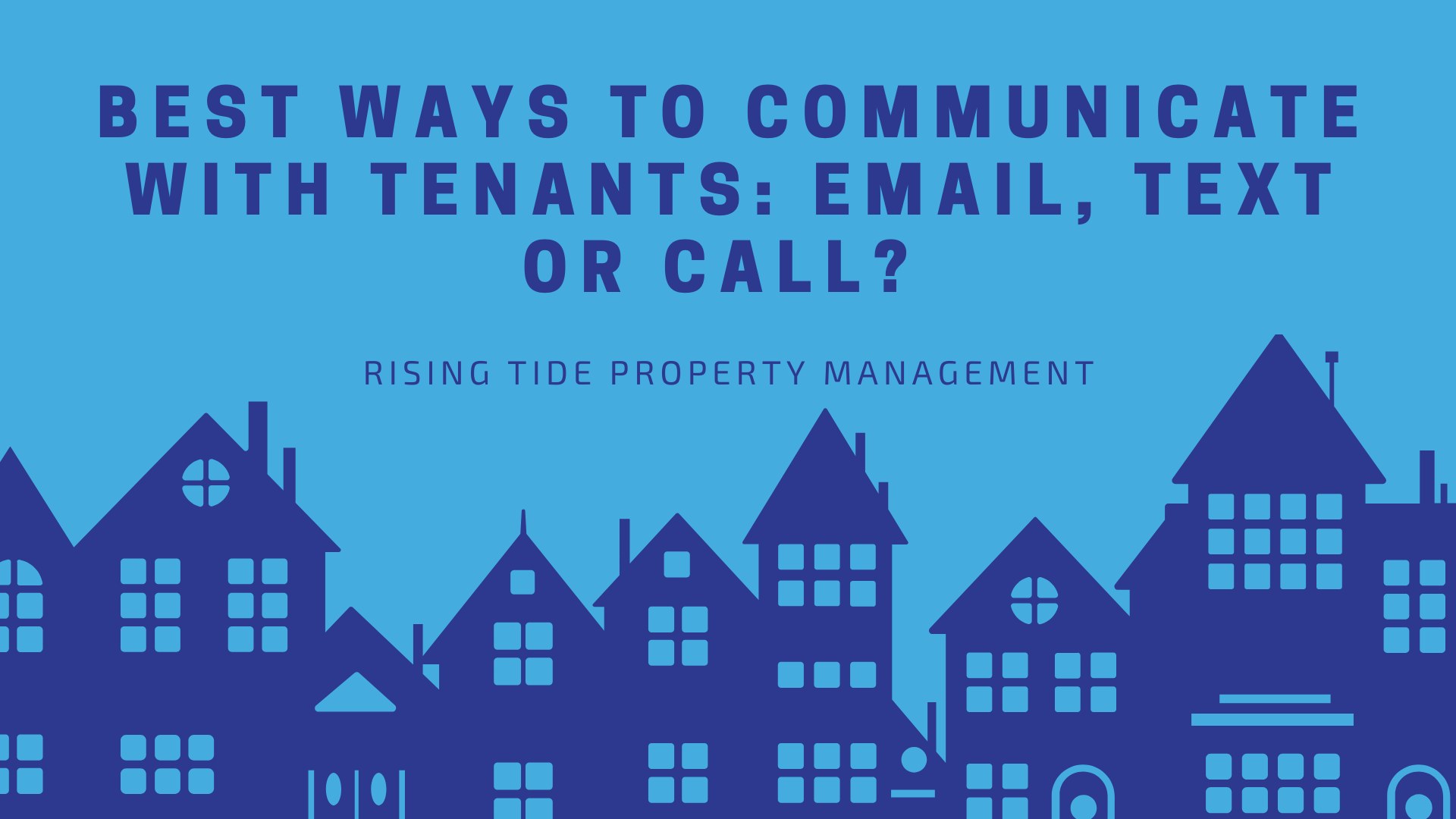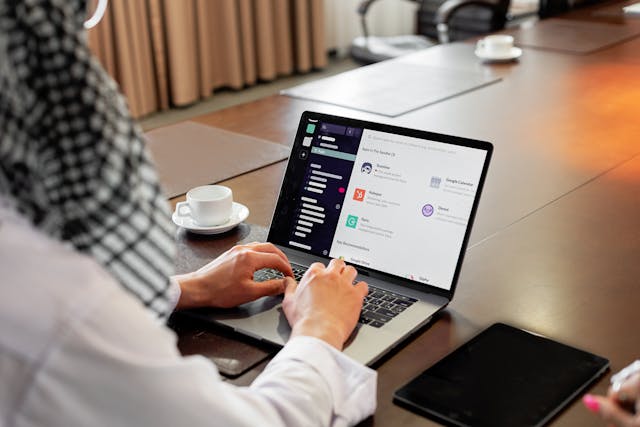Best Ways to Communicate With Tenants: Email, Text or Call?
Key Takeaways:
-
Choose the Right Communication Method: Use email for formal, documented matters, text for quick updates, and phone calls for urgent issues.
-
Legal Compliance Matters: Landlords need to follow legal guidelines, ensuring notices are in writing when required to avoid legal complications.
-
Clear Communication Builds Strong Relationships: Timely, clear, and professional communication helps avoid misunderstandings and fosters better tenant relations.
At Rising Tide Property Management, we know that effective communication is a key part of managing rental properties successfully. Clear and timely communication helps avoid misunderstandings, ensures that tenants stay informed, and makes handling maintenance requests and rent payments smoother.
Effective communication enhances tenant response and property management. The three main methods, email, text, and phone, serve different situations based on urgency, documentation, and message type. Here’s how to choose the correct form of communication and how to use them efficiently.
Contact Us Today!
Email: Best for Formal and Non-Urgent Communication
Email is a useful tool for sending detailed information and keeping records of conversations. It is ideal for situations where documentation is important, such as lease agreements, policy changes, or maintenance notices.
Unlike text messages and phone calls, emails allow tenants to review the information at their convenience, which makes them suitable for non-urgent matters.
When to Use Email
- Sending lease agreements, rent receipts, or other important documents.
- Informing tenants about upcoming maintenance, inspections, or rule changes.
- Answering tenant questions that require a detailed response.
- Following up on previous conversations to maintain written records.
Tips for Using Email Effectively
- Be Clear and Concise: Use simple language and organize information with short paragraphs or bullet points.
- Use a Professional Tone: Keep the message polite and to the point, even when addressing complaints.
- Write Descriptive Subject Lines: A clear subject line such as “Notice: Scheduled Maintenance on June 10” helps tenants quickly understand the purpose of the email.
- Proofread Before Sending: An email error can create confusion. Reviewing the message before sending ensures clarity.
- Request a Response When Needed: If a tenant needs to acknowledge an email, ask them to reply to confirm they received it.
Text Messaging: Best for Quick and Informal Communication
Text messaging is one of the fastest ways to communicate with tenants. Most people check text messages frequently, making this method effective for time-sensitive updates. However, texts should be kept short and shouldn’t be used for complex or sensitive discussions.
When to Use Text Messaging
- Sending reminders about rent payments, maintenance visits, or scheduled inspections.
- Notifying tenants about urgent repairs or unexpected property issues.
- Confirming appointment times for repairs or meetings.
- Quickly answering simple tenant questions.
Tips for Using Text Messaging Effectively:
- Get Tenant Consent First: Some tenants may prefer email or phone calls. Always ask before sending texts.
- Keep Messages Short: Keep texts short and to the point. If a detailed explanation is needed, suggest continuing the conversation via email or phone.
- Be Professional: Even though texts are informal, they should be respectful and free of slang.
- Use for Urgent but Non-Emergency Issues: For serious emergencies such as flooding or fire, a phone call is needed.
- Avoid Discussing Sensitive Information: Lease violations, complaints, or legal matters should be handled through email or in person, not by text.
Phone Calls: Best for Urgent and Personal Communication
Phone calls are the most effective way to handle urgent situations or matters that require immediate discussion. A conversation allows both parties to ask and answer questions in real-time, which helps resolve issues quickly.
When to Use Phone Calls:
- Responding to emergencies such as water leaks, fires, or security concerns.
- Addressing tenant complaints or conflicts.
- Discussing lease renewals, rent increases, or other important policy changes.
- Resolving urgent concerns that can’t wait for an email or text response.
Tips for Using Phone Calls Effectively:
- Respect the Tenant’s Time: If possible, ask if it is a good time to talk before discussing an issue.
- Keep Records of Calls: After a call, send a follow-up email summarizing what was discussed to have a written record.
- Stay Calm and Professional: Even if a tenant is frustrated, respond in a professional and composed manner.
- Use Calls for Complex or Sensitive Issues: Some conversations require more discussion than a text or email can provide.
- Call During Reasonable Hours: Avoid calling tenants late at night or early in the morning unless it is an emergency.
Legal Considerations in Communication
Experienced and first-time landlords must understand the legal guidelines for tenant communication. Many rental laws require specific notices to be delivered in writing, and failing to comply can lead to legal issues. Ensuring proper documentation helps protect both landlords and their investments.
When Written Notices Are Required:
- Lease Violations: If a tenant has broken the terms of the lease, landlords must usually provide a written notice outlining the issue and any corrective action required.
- Eviction Notices: Legal eviction proceedings typically require written documentation that follows state and local laws.
- Rent Increases: In most areas, landlords must give written notice before increasing rent. The amount of notice required varies by location.
- Entry Notices: Many jurisdictions require landlords to give tenants written notice before entering a rental unit for inspections or repairs, usually with at least 24 hours notice.
Best Practices for Legal Communication:
- Know Local Laws: Each state and city may have different rules regarding how landlords must communicate with tenants. Always follow local regulations.
- Keep Records of All Communication: Whether sent by email or letter, keeping copies of notices can protect landlords in case of disputes.
- Use Certified Mail When Necessary: For important legal notices, using certified mail with a return receipt provides proof that the tenant received the message.
- Provide Clear and Specific Information: Notices should include important details such as dates, required actions, and any deadlines.
- Follow Up When Needed: If a tenant does not respond to an important notice, following up with a call or additional written communication may be necessary.
Bottom Line
Clear communication is key to managing rentals efficiently and keeping tenants satisfied. Emails work best for formal, documented matters, texts for quick updates, and calls for emergencies. Managing tenant communication takes time, but Rising Tide Property Management handles it all, ensuring messages are clear, timely, and professional. Contact us to streamline your rental management.




